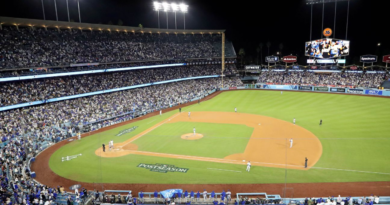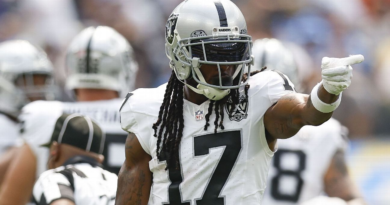Barcelona show fight against Man United as recovery continues
For Barcelona‘s Europa League tie against Manchester United on Thursday, there are 90,255 people inside Camp Nou, despite the bite taken out of the south stand. Part of the house that Laszlo Kubala built has been pulled out and packed up like a piece of Lego, removed from the continent’s biggest stadium, soon to be abandoned and bulldozed entirely, living possibly its last European night. They hope not, but if so, then this is a good way to go.
The roar when defender Ronald Araujo wipes out Jadon Sancho; Marcos Alonso pointing to the sky in the name of the father who played here too; Gavi skidding across the turf, with grass in his face. The fear when United forward Marcus Rashford runs, which he does a lot. Worse, when midfielder Pedri pulls up injured, hope taken with him. But then given back again: Ansu Fati, is that you? The noise when Raphinha’s cross somehow finds the net, the ball not touched by Robert Lewandowski but guided there, like he has used “The Force.” The whistles when Raphinha is taken off, unwillingly and boiling on the bench, hitting out now and apologising later. Don’t apologise, his manager, Xavi, says. Insult me if you must — just want to win.
Barcelona don’t; it ends 2-2. Yet at the final whistle, poor Maurizio Mariani, the referee, is stuck in the middle. Both managers after him, one in each ear: Xavi to the left; Erik ten Hag to the right. We could have won, should have a penalty, one says. And so does the other. The Barcelona manager talks about a penalty like a cathedral, which makes sense in Spanish: Huge, obvious, these are not buildings that go unseen. The Manchester United manager says maybe the referee felt the pressure of this place, which Barcelona might think is good too.
– Stream on ESPN+: LaLiga, Bundesliga, more (U.S.)
Ten Hag calls it a meeting of “two good teams of the highest level, enjoyable to watch — a real high performance level from both teams.” Xavi is satisfied to have competed with a “spectacular team, one of the best in Europe right now.” There are those two penalty shots, four goals, a shot off the post, some serious saves, lots of efforts on goal — 35 of them — and lots and lots of people. In short, this is the way it was supposed to be, the way it used to be. And, they hope, could be again. Just maybe not quite yet.
Here’s a question: Is Liverpool vs. Real Madrid and Manchester United vs. Barcelona in the same week, 30 miles apart, the best concentration of clubs there has been? They play on different days and different stages, but at Camp Nou for 90 minutes, it didn’t feel like it, and that was very much the point. United and Barcelona were European Cup finalists in 2009 and 2011; now here they were in a playoff to reach the Europa League round of 16.
These two teams had needed a “reset,” Ten Hag said. They were getting there, on their way back. Look at their results over the past 15 games: 30 matches between them, just one draw. This will show us where we are, United defender Luke Shaw had said, and that was a recurring theme, especially in Catalonia.
It would show Barcelona too; maybe even more so, in fact. Their last 15 read: Won 14, drawn 1. They had won the Spanish Supercopa, taking Real Madrid apart like the Camp Nou, piece by piece until there was almost nothing left. They had opened up an eight-point lead at the top of the table and had conceded just one goal in seven games. They had conceded just seven in LaLiga all season.
But the doubts lingered — not just about them, but about all of them, the competition. How good were they really? How real was this? Games are too often referred to as tests, but this really did feel like one. A way of working out what the last few months meant, how far Barcelona had come. It was welcome, too, some actual sport at a time when a grubby, scandalous story had emerged about Barcelona reportedly paying the vice president of the referees’ committee over €7 million across 18 years — not that you would know it by reading some newspapers in the city. “I try to focus on the football, but this club has these things,” Xavi said.
That recovery was already reflected in the stands, full and dressed in blaugrana, too. What, they wondered, was Barcelona’s ceiling this season? Barcelona had competed, Xavi said, which is something. It is a start, certainly. But it also falls a little short, the kind of thing the coach of a second division team says after falling to someone from the top flight in the cup. There’s another one that gets overused: the old “what did we learn?” piece, like every match is a lesson, a place to draw conclusions, for which everyone looks too hard. This time, that actually applied.
Or so it goes. At the end of a 2-2 draw, a night that belonged to another place and another competition but maybe, just maybe gave a few glimpses of why it was being played out here instead, there was reason to be “proud,” Xavi said. Some things were clarified, if not always the ones that might have been intended, and questions remained. Do you want the good news or the bad news?
Leaving centre-back Andreas Christensen out was a surprise after a few months in which he has quietly got on with being one of the best defenders in Spain. Swapping Araujo and Jules Kounde — the former at full-back, the latter in the middle — did too. Kounde had adapted to the right; on his return, this was a difficult night. If it was about stopping Rashford, it demonstrably didn’t work. Lewandowski looked oddly off, except that has been recurring of late. Gavi is fundamental, contagious, leading the press, flying into everything. Not just because he’s feisty, not just because he gets there first, but because he sees it first. Pedri is the control, which was lost when he departed injured.
And that’s the thing, or one of them. At 2-1, Barcelona were not so much on the ropes as hanging through them, dangled precariously over the judges’ table. “We should have scored four,” Ten Hag said afterward. Rashford was overrunning them, but then, suddenly, they were on their feet again, swinging. The late changes (and a fairly lucky goal) brought them back: a different Barcelona, less organised, less steady, but rebelling. And certainly not folding.
They could have won. Which is not to say they should have; Europe is different now. United are too, Barcelona knew that. In context: they have faced Bayern Munich, Inter Milan and Man United. It’s not the same, and it shows. Seven goals conceded in 21 league games this season; 14 in seven European games. Barcelona have won just two of their past 12 games at Camp Nou in Europe and there might not be any more. Both Pedri, injured, and Gavi, suspended, will miss the trip to Old Trafford, which could be the last stop. But if this was anything to go by, it will be good.
And that matters. For all the questions, the rush to draw conclusions, find a place, most just wanted to watch their team, to support them. To enjoy this. To win, yes. Or to have a go, at least. And so they did, 90,255 still there and shouting as the last ball went into the United area. Right place, right game, wrong day. Thursday night, you’re having a laugh.




